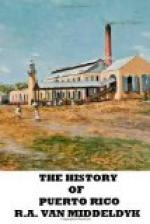A coup d’etat saved the country. General Pavia, the Captain-General of Madrid, with a body of guards forced an entrance into the halls of congress and turned the Deputies out (January 3, 1874). A provisional government was once more constituted with Serrano at the head. His first act was to dissolve the Cortes.
* * * * *
The events just summarized exercised a baneful influence on the social, political, and economic conditions of this and of its more important sister Antilla.
Royalists, Carlists, Liberals, Reformists, Unionists, Moderates, and men of other political parties disputed over the direction of the nation’s affairs at the point of the sword, and as each party obtained an ephemeral victory it hastened to send its partizans to govern these islands. The new governors invariably proceeded at once to undo what their predecessors had wrought before them.
They succeeded each other at short intervals. From 1837 to 1874 twenty-six captains-general came to Puerto Rico, only six of whom left any grateful memories behind. The others looked upon the people as always watching for an opportunity to follow the example of the continental colonies. They pursued a policy of distrust, suspicion, and of uncompromising antagonism to the people’s most legitimate aspirations.
The reactionists, in their implacable odium of progress and liberty, considered every measure calculated to give greater freedom to the people or raise their moral and intellectual status as a crime against the mother country; hence the utter absence of the means of education, and a systematic demoralization of the masses.
Don Angel Acosta[53] mentions the Count de Torrepando as an example of this. He came from Venezuela to govern this island in 1837, with the express purpose, he declared, of diverting the attention of the inhabitants from the revolutionary doings of Bolivar.
Gambling was, and is still, one of the ruling vices of the common people. He encouraged it, established cockpits in every town and instituted the carnival games. He also established the feast of San Juan, which lasted, and still lasts, the whole month of June; and when some respectable people, Insulars as well as Peninsulars, protested against this official propaganda of vice and idleness, he replied: “Let them be—while they dance and gamble they don’t conspire; ... these people must be governed by three B’s—Barraja, Botella, and Berijo.” [54] General Pezuela, a man of liberal disposition and literary attainments,[55] stigmatized the people of Puerto Rico as a people without faith, without thought, and without religion, and, though he afterward did something for the intellectual development of the inhabitants, in the beginning of his administration (1848-1851) thought it expedient not to discourage cock-fighting, but regulated it.




